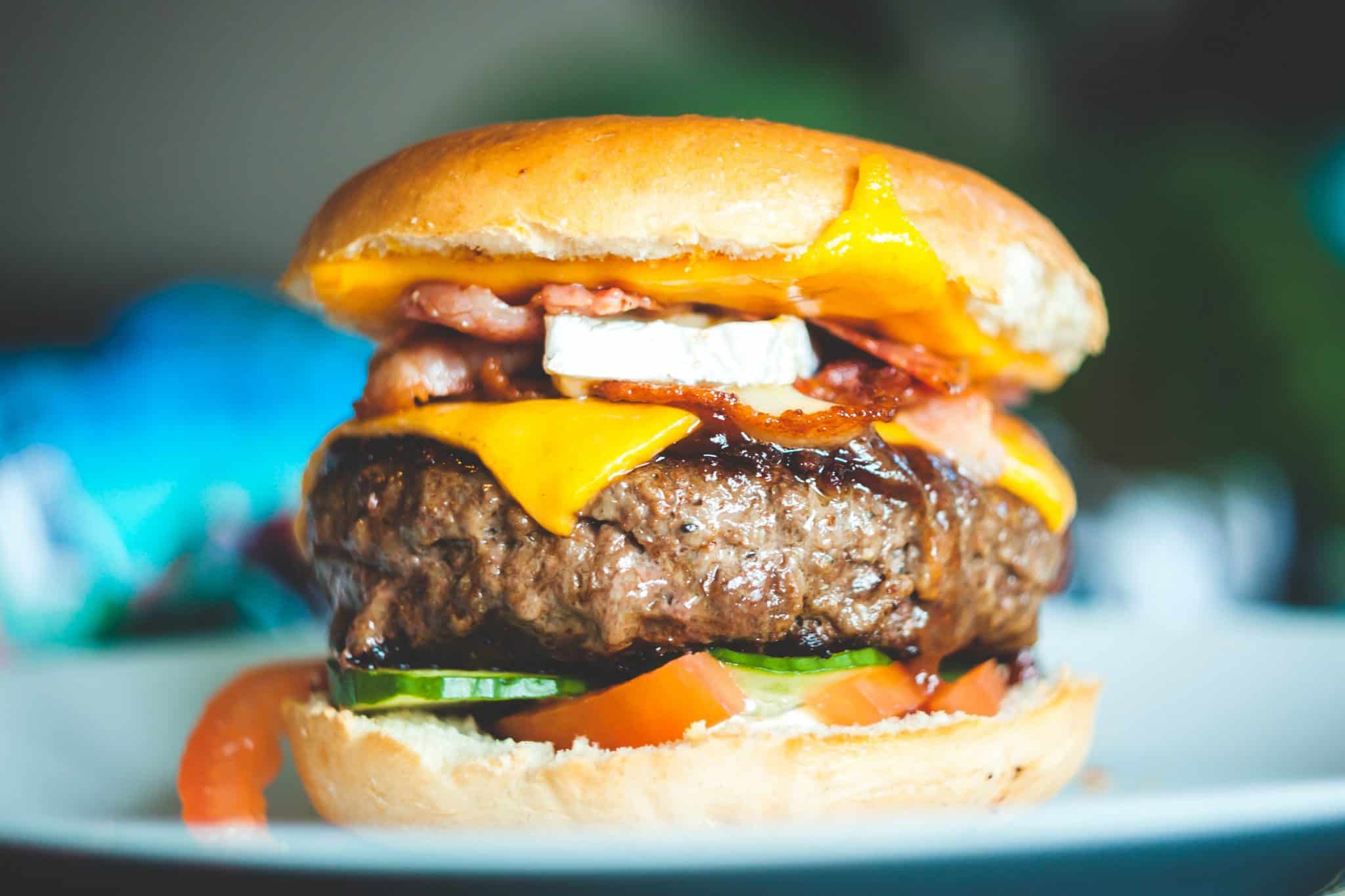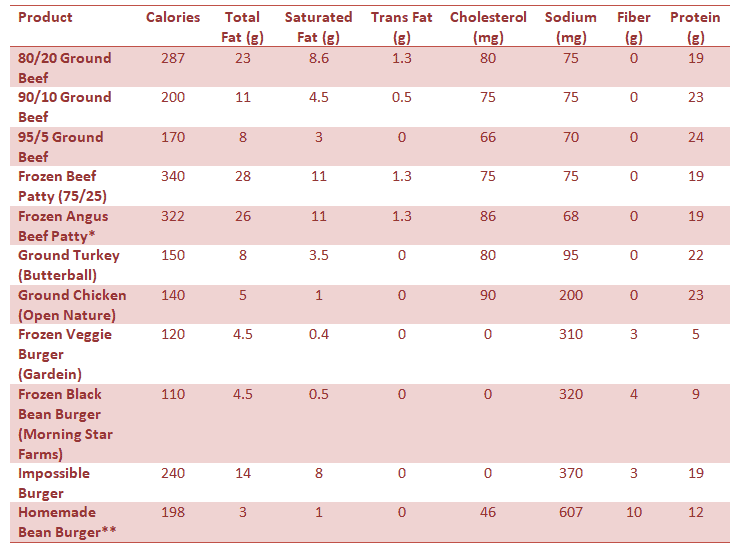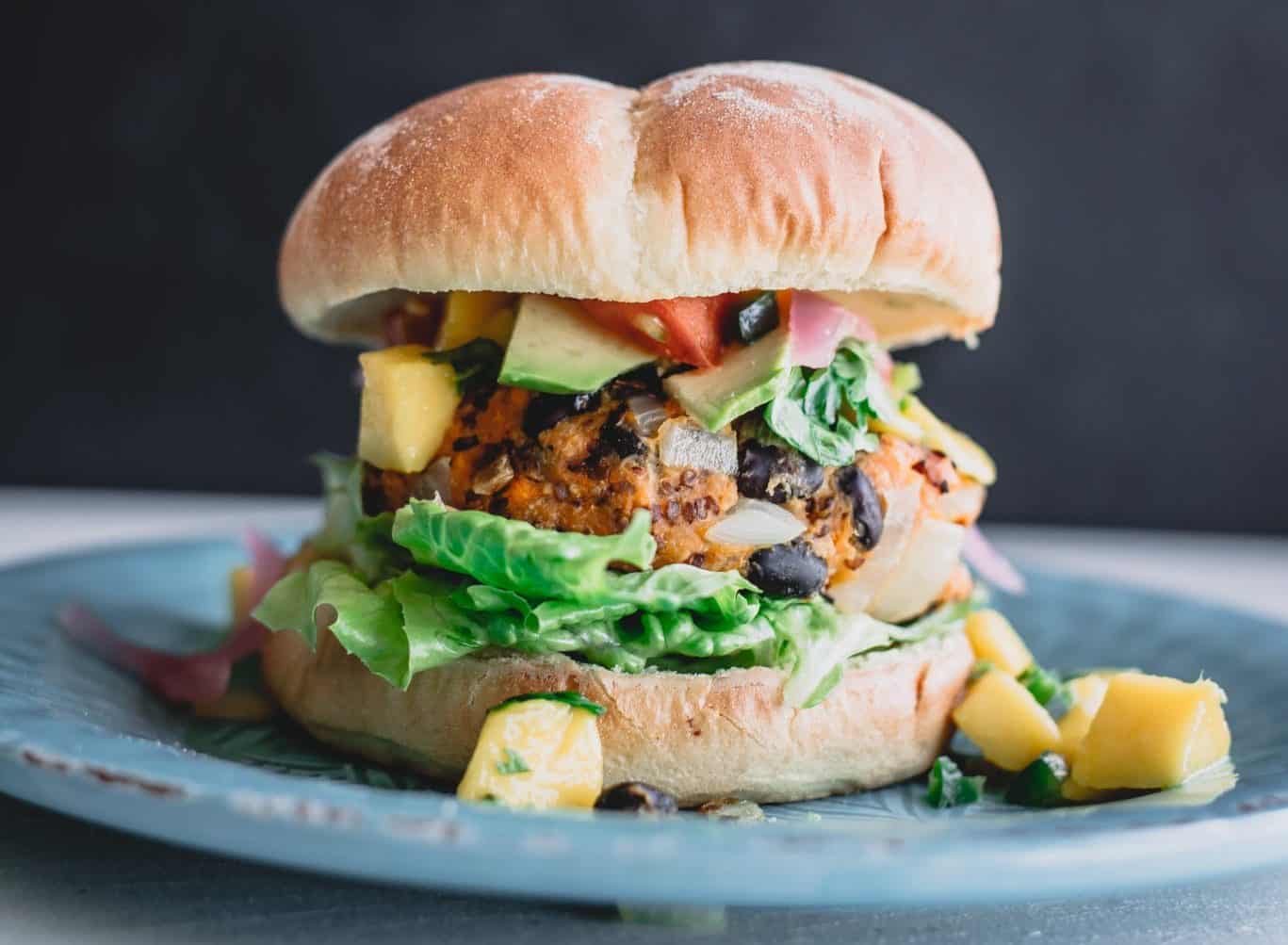This week we honor America’s independence (where is the summer going?!). Many people will celebrate by tossing some burgers on the grill. I mean, what’s more American than that? Well, maybe hot dogs I guess...but that’s another post! If you’ve been wondering just what the difference is among all those burgers and which is best, this is for you! Read on for a comparison on burgers!

Let’s start with some general health and nutrition basics:
Calories
The “average” person should be consuming around 2000 calories per day. Slightly more for men, slightly less for women. If you’re trying to lose weight or are just a small person, your needs might be less. But for the sake of example, let’s go with the 2000 calories.
Fats
For people with heart disease, or at risk for heart disease (i.e. most of us), the amount of total fat we should consume is around 30% of calories. That’s about 67 grams of fat. Saturated fat should be limited to 5-6% of total calories, which works out to 13 grams (that’s part of the 67 grams of total fat, not in addition to). The recommendation for trans fat is 0 grams. Trans fats have been found to both increase LDL (“bad” cholesterol) and decrease HDL (“good” cholesterol). A double whammy to your health.
There is no specific limit on cholesterol, however the Dietary Guidelines for Americans recommend eating as little as possible. If you want to learn more about cholesterol, check out this post!
Sodium
Sodium is well-known to cause increased blood pressure in some people, especially those at risk for heart disease, or who already have it. Consider that, unless you exercise intensely, and/or sweat a lot, your body only needs about 500 mg sodium per day. Most people consume well in excess of 3500 mg sodium per day (learn more about how to decrease that here). If you have high blood pressure, or if it runs in your family, the recommendation is 1500 mg or less per day.
Fiber
The recommended fiber intake is at least 25 grams per day, depending on your age and sex (see page 146 of for a table of recommendations). More is okay, just make sure to increase it slowly, and drink plenty of fluids. Fiber has tons of benefits, and is essential for heart health. More to come in a future post on that, but you can read more about it using the previous link if you’d like!
Protein
Most people eat more protein than they need. Even people following vegan diets (no animal foods), tend to get more than needed. So this isn’t a concern for the vast majority of people. The recommendation for protein is 0.8 grams of protein for every kilogram of body weight. Very active people, and those over 60 may need more (unless you also have kidney problems). If you’re not into doing the math, use this handy calculator!
Size Matters!
For our burger comparison, we’ll use a reference of ¼ pound, as most frozen patties seem to be that size. Keep in mind, I’m just comparing the burger patties. The numbers do not represent the bun, any fun things you might add to the mixture before cooking, or any condiments you might use. Now that you’ve got the basics of what we’ll be comparing, let’s jump into these burgers!

Below, is a table comparing the nutritional content of 11 different popular burgers.

*Reference Bubba Burger, scaled from ⅓ lb to ¼ lb
** Reference Black Bean Burgers from Allrecipes. (Note: the nutrition of homemade food varies wildly.)
So which is the best one? As with all things related to nutrition, it's not a cut and dry answer. It depends on what your goals are, and what matters to you (your values). It also depends on what you add to the burger before you cook it! Those ranch dressing packets, eggs, and other condiments might add a lot of flavor, but also add sodium, cholesterol, sugar, etc. I like to keep the burgers simple and add tons of flavor with toppings. Additions like hummus, sauteed mushrooms or peppers and onions, guacamole, vinegar and oil cole slaw, quick pickled onions, or whole grain mustard amp up the flavor while still keeping it healthy.
YOUR GOAL:
Weight loss
Since weight loss comes down to total calories at the end of the day, the best burger for weight loss in this list is Morning Star Farms Black Bean Burger at 110 calories. Keep in mind, a bun is likely to add around 200 or so calories, and condiments are a toss-up depending on what you use. Here are some options to keep the calories down:
- Use no bun, or half the bun
- Forgo the mayo, and stick with ketchup and mustard, and lots of veggies - think lettuce, tomatoes, pickles, and onions.
- Are there baked beans or cole slaw there? Try topping your burger with a side dish you were already going to eat instead of condiments and save yourself those calories!
- How important is cheese to you? Make the decision now. A slice of cheese is around 100 more calories.
Heart Health
Heart health is multifaceted. But to keep it simple, the best burgers on this list for heart health are probably either the homemade bean burger, or the ground chicken burger. Both contain similar amounts of fat and cholesterol. The bean burger is higher in sodium, however since it's homemade, that could be lowered - in fact just about all of the nutrition in that burger can be modified. The bean burger gains a slight edge in the fiber department with 10 grams, whereas the chicken has none (try my Mediterranean Black Bean Quinoa Burger for a fun variation!). Here are some tips to help keep your burger heart healthy:
- Try using hummus instead of cheese on your burger. It's slightly salty without being over the top, it's creamy, and it's got none of the saturated fat of the cheese.
- Load up your burger with tomatoes, lettuce, onions, and any other raw veggies. Think long and hard about toppings like cheese, bacon, and fried onions.
- Look for whole grain buns instead of regular white ones.
- Go easy on condiments. A little is fine, but they are usually high in sodium. Consider making your own, like this Healthy Ketchup recipe.
Healthiest Animal Burger
I'm giving this distinction to the ground turkey burger. Despite having a bit more calories and fat than the chicken, it's got less sodium. With the increased fat content, the burger will stay juicier on the grill, while still being relatively low in fat. It narrowly edges out the 95/5 burger though, so if you really wanted a beef burger, that one is the one.
Healthiest Vegetarian Burger
For this I'll go with the homemade bean burger. I know it's more work, but not much more than making hamburgers from scratch. Making them yourself gives you complete control over the ingredients and nutrition. By using dry beans instead of canned, you can cut the sodium content drastically. Using ground flax instead of egg will remove the cholesterol. And this version has more protein and fiber than the frozen options.

There aren't right or wrong answers here. My general rule of thumb is of give and take. So maybe for your next picnic, you have the burger with cheese in a lettuce wrap, but maybe next time you want the burger with a whole bun and no cheese. You choose what's right for you!
What's your favorite type of burger for picnics, and how do you keep it healthier?


Leave a Reply